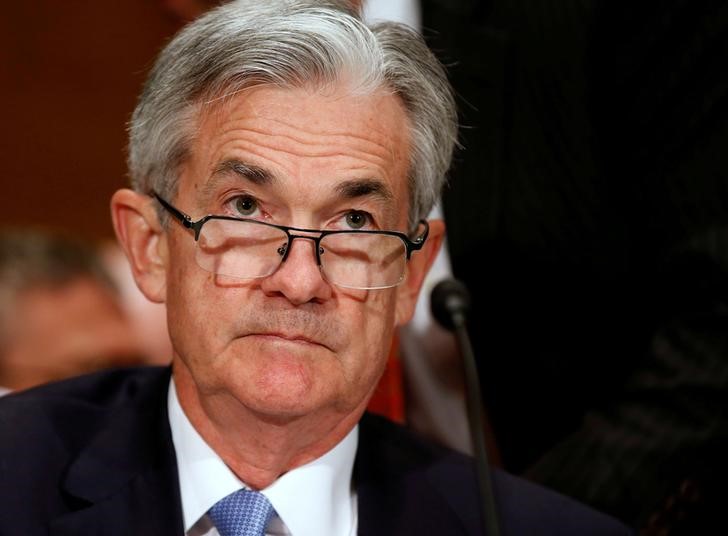 © Reuters. FILE PHOTO: Jerome H. Powell, a governor on the board of the Federal Reserve System, prepares to testify to the Senate Banking Committee on Capitol Hill in Washington
© Reuters. FILE PHOTO: Jerome H. Powell, a governor on the board of the Federal Reserve System, prepares to testify to the Senate Banking Committee on Capitol Hill in WashingtonBy Michelle Price and Pete Schroeder
WASHINGTON (Reuters) – Jerome Powell’s nomination by President Donald Trump to serve as the next head of the U.S. Federal Reserve, if announced later this week, could be a boon for smaller lenders given his desire as a current Fed board governor to focus on bank size when reviewing rules introduced after the 2008 crisis.
Powell is seen as the favorite among five candidates with current Fed chair Janet Yellen’s term due to expire in February 2018, and an announcement is possible on Thursday this week.
Trump is choosing from a slate of candidates ranging from Yellen, an economist who is seen as the most cautious on changing the so-called Dodd Frank banking reforms of 2010, to economist John Taylor, a proponent of deregulation.
Trump has pledged to deregulate the financial sector to boost economic growth, but the industry has had to wait for several key federal agency appointments.
The chairmanship of the Fed is widely seen as one of the most important of these positions, due to the central bank’s extensive banking oversight role.
If picked, Powell, who is a lawyer and former investment banker, rather than an economist, will bring to the job both knowledge of the financial industry and a stated desire to lighten the regulatory load, especially on smaller banks.
Powell, who has been a Federal Reserve board governor since 2012, played a key role in drafting new bank regulations after the 2008 crisis and will likely offer more continuity for Wall Street than other candidates, analysts said.
However, as Fed chair he would be freer to pursue his stated agenda of adjusting or eliminating some rules that he sees as redundant or inefficient.
John Silvia, chief economist at Wells Fargo (NYSE:), said Powell’s experience at the Fed equipped him to maneuver the institution through a difficult period, adding: “As an attorney, he can probably look critically at a lot of regulations that have emerged.”
Handed broad new powers by the 2010 Dodd-Frank financial reform law, the Fed plays a leading role in the oversight of the biggest financial institutions in the world, including overseeing annual bank “stress tests” and monitoring any non-banks deemed critical to the financial system.
The Fed has recently begun to review how it wields its newly-acquired powers to potentially offer some regulatory relief, given the crisis is now ten years ago. Powell has been at the heart of this debate.
“There was always going to be a time when we would look back and say all this innovative new regulation..is it done right?” Powell, 64, said at a Reuters event this month.
“Can we achieve this safety and soundness objective, this stability objective, at a lower cost to consumers and financial institutions, can we do it more efficiently, what parts of it are essential, what parts of it are redundant?”
Speaking during the same Reuters event, Powell said higher capital and liquidity requirements, and stress tests to show how a bank could handle market shocks, along with so-called “living wills” outlining how a bank can be unwound, have made the financial system safer and must be preserved.
But his top priority, he continued, is to ensure the rules are better “tailored” to the institution concerned, and that smaller banks should enjoy a lighter touch.
In particular, Powell has said that the so-called “Volcker Rule” banning banks from proprietary trading is not appropriate for smaller banks who pose less systemic risk and should be re-written to include a narrower range of institutions.
The Fed governor is also open to improving the transparency of the stress-testing process and tweaking other rules such as the “enhanced supplementary leverage” ratio which requires banks to hold more capital.
As Powell gets to work, he will have a close ally on the Fed board in the form of Randal Quarles, a lawyer who was appointed to the role of Fed vice chair for supervision on Oct. 13 to lead the bank’s regulatory work.
A former private equity investor, Wall Street lawyer and Under Secretary to the U.S. Treasury, Quarles has also advocated tempering some of the Dodd-Frank banking regulations.
As Fed vice chair for supervision, Quarles is considered the official in charge of regulatory matters, but he will still report to and have to work closely with the new Fed chair.
“I have known him for 25 years as a close friend, I think he’s a terrific appointment, and I look forward to reuniting with him,” Powell said in October.
Source: Investing.com



























